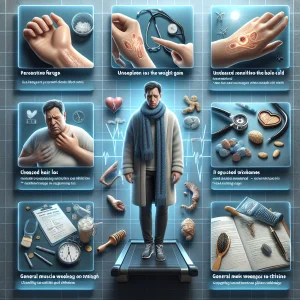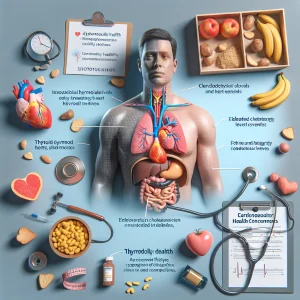In-Depth Analysis of Health Risks Associated with Hypothyroidism in Men
Hypothyroidism in men represents a critical health concern characterized by the thyroid gland’s inability to produce sufficient amounts of vital hormones. The primary hormones involved, thyroxine (T4) and triiodothyronine (T3), are essential for regulating key bodily functions such as metabolism, energy levels, and overall health stability. Although hypothyroidism can affect individuals of any gender, men frequently face unique challenges associated with this condition. Understanding these specific challenges is fundamental for effective treatment and management strategies, enabling men to maintain their quality of life and achieve optimal well-being.
Gaining a thorough understanding of the complexities of hypothyroidism is vital for implementing effective treatment and management plans. Many men may overlook or misinterpret symptoms, attributing feelings of fatigue or stress to their hectic lifestyles or normal aging processes. This can lead to prolonged discomfort and severe health repercussions. Early symptom recognition is crucial; identifying signs of hypothyroidism early can facilitate timely interventions, thereby significantly improving health outcomes and overall life quality.
Multiple factors can lead to the development of hypothyroidism, including autoimmune disorders such as Hashimoto’s thyroiditis, certain medications, and complications arising from radiation therapy. Early identification of these symptoms is essential for initiating effective intervention strategies that can ultimately enhance health and elevate the quality of life for affected individuals.
Essential Insights Every Man Should Have About Hypothyroidism
- Hypothyroidism results from the inadequate production of thyroid hormones, which can lead to various physical and mental health challenges specifically in men.
- Common physical symptoms may encompass persistent fatigue, unintentional weight gain, hair thinning, and muscle weakness, alongside heightened risks for high cholesterol, cardiovascular disease, and diabetes.
- The psychological ramifications can manifest as depression, anxiety, and cognitive difficulties, significantly affecting a man’s quality of life and emotional well-being.
- This condition also adversely impacts sexual health, potentially leading to reduced libido, erectile dysfunction, and fertility complications.
- Managing weight becomes particularly difficult for men, as low thyroid hormone levels can decelerate metabolism, complicating efforts to maintain a healthy weight.
 Identifying the Physical Symptoms and Health Risks of Hypothyroidism
Identifying the Physical Symptoms and Health Risks of Hypothyroidism
The physical symptoms associated with hypothyroidism can vary extensively among affected individuals. Men experiencing this condition frequently report chronic fatigue, unanticipated weight gain, increased sensitivity to cold, and muscle weakness. You may find yourself feeling unusually exhausted even after a full night’s sleep, or struggling to manage or lose weight despite adhering to a healthy diet and regular exercise routine.
Such symptoms can lead to self-doubt regarding your health and lifestyle choices. Additionally, hypothyroidism may present less obvious symptoms, including dry or pale skin and noticeable hair loss. Early recognition and management of these symptoms are crucial for restoring health and well-being. Being mindful of these changes can prompt timely medical consultations and necessary interventions to improve your health.
Furthermore, hypothyroidism can induce a slower heart rate, which may contribute to feelings of lethargy and diminished stamina during physical activities. The cumulative effects of these physical symptoms can substantially disrupt daily life and overall functionality. Therefore, if you suspect that hypothyroidism may be influencing your health, seeking professional medical advice is imperative for proper diagnosis and treatment.
Examining the Mental and Emotional Challenges Associated with Hypothyroidism
The mental and emotional repercussions of hypothyroidism are often overlooked, yet they require significant attention. As thyroid hormone levels decline, you may experience mood swings, intensified feelings of depression, and increased anxiety levels. These emotional fluctuations can lead to irritability and fatigue, potentially straining personal relationships and diminishing overall life satisfaction.
Research has underscored the complex relationship between thyroid function and mental health, highlighting the necessity of recognizing this connection for effective management. Cognitive decline is another concern, with individuals frequently reporting symptoms like “brain fog.” You might struggle with concentration, forget routine tasks, or feel mentally sluggish, particularly in situations that demand quick thinking and clarity.
Recognizing these cognitive and emotional challenges is essential for advocating appropriate medical treatment. For comprehensive information regarding the relationship between hypothyroidism and mental health, consider visiting the Mayo Clinic’s website, which offers valuable resources and insights.
 The Significant Impact of Hypothyroidism on Male Sexual Health
The Significant Impact of Hypothyroidism on Male Sexual Health
Hypothyroidism can profoundly affect sexual health in men, resulting in a range of complications. Decreased levels of thyroid hormones may lead to diminished libido, erectile dysfunction, and potential infertility. You might notice a significant decline in your sexual interest or encounter difficulties in achieving or sustaining an erection.
These challenges related to sexual health can be distressing, leading to feelings of inadequacy, frustration, and anxiety in intimate relationships. The hormonal imbalances caused by hypothyroidism can also disrupt testosterone levels, adding complexity to the already intricate nature of sexual health. Low testosterone levels can exacerbate fatigue, emotional instability, and reduced sexual desire, creating a challenging cycle that may be difficult to break.
Engaging in candid discussions with your healthcare provider about these sexual health concerns is vital. Exploring effective treatment options can aid in restoring both thyroid function and sexual health, ensuring a comprehensive approach to overall well-being and enhancing your quality of life.
Effective Weight Management Strategies for Men with Hypothyroidism
Weight management often poses significant challenges for men diagnosed with hypothyroidism. The reduced metabolic rate typically associated with low thyroid hormone levels can severely hinder your capacity to lose or maintain a healthy weight. Even with a consistent exercise program and balanced diet, you may find it exceptionally challenging to shed unwanted pounds.
This ongoing struggle can foster feelings of frustration and hopelessness concerning weight management efforts. Understanding the intricate relationship between hypothyroidism and weight gain is essential for formulating effective strategies. Collaborating closely with a healthcare provider can assist you in developing a personalized plan that prioritizes both thyroid health and weight management goals.
This collaborative strategy may involve adjusting medications, modifying dietary habits, and incorporating specific exercise regimens designed to boost metabolism while accommodating your energy levels. Gaining clarity on this relationship empowers you to take control of your health and achieve your weight management objectives.
 Understanding the Relationship Between Hypothyroidism and Cardiovascular Health Risks
Understanding the Relationship Between Hypothyroidism and Cardiovascular Health Risks
The association between hypothyroidism and cardiovascular health is a pressing concern for men diagnosed with this condition. Insufficient thyroid hormone levels can lead to elevated cholesterol, increasing the risk of heart disease over time. It’s vital to recognize that the fatigue and lethargy often accompanying hypothyroidism may not only indicate the disorder but could also signal underlying cardiovascular issues that require medical evaluation.
Regular cardiovascular assessments are crucial for individuals with hypothyroidism. Your healthcare provider may advise implementing lifestyle changes, including a heart-healthy diet that emphasizes fruits, vegetables, whole grains, and lean proteins. Additionally, engaging in regular physical activity appropriate for your energy levels can support thyroid function and bolster cardiovascular health. By actively managing both thyroid function and cardiovascular fitness, you can significantly mitigate the risk of further health complications.
Assessing the Impact of Hypothyroidism on Male Fertility
Fertility challenges represent a significant concern associated with hypothyroidism in men. Low levels of thyroid hormones can disrupt the delicate hormonal balance necessary for optimal sperm production and overall reproductive health. If you are experiencing difficulties in conceiving, it is essential to consider how your thyroid function may be influencing your fertility journey.
Effectively addressing hypothyroidism can enhance your overall health and improve the likelihood of successful conception. Partnering with a knowledgeable healthcare provider who understands the intricate relationship between thyroid function and fertility is crucial for crafting a comprehensive strategy that addresses both issues. This may involve routine hormone level monitoring through blood tests and adjusting medications to optimize reproductive health outcomes.
Holistic Strategies for Managing and Treating Hypothyroidism in Men
Successfully managing hypothyroidism requires a comprehensive approach that encompasses regular monitoring through blood tests, medication management, lifestyle adjustments, and open communication with healthcare professionals. Blood tests are critical for diagnosing hypothyroidism, measuring essential indicators such as Thyroid-Stimulating Hormone (TSH) and T4 levels. Elevated TSH levels typically indicate an underactive thyroid, while low T4 levels confirm the diagnosis.
Upon receiving a diagnosis, treatment generally involves hormone replacement therapy with synthetic thyroid hormones like levothyroxine. This medication serves to restore normal hormone levels, alleviating many symptoms associated with hypothyroidism. Regular follow-up appointments are essential to assess treatment efficacy and make necessary adjustments based on blood test results.
In addition to pharmaceutical interventions, incorporating lifestyle modifications—such as following a nutrient-dense diet that supports thyroid health, including adequate amounts of iodine, selenium, and zinc—can be beneficial. Participating in regular exercise that aligns with your energy levels can also help manage symptoms while promoting overall wellness. By actively engaging in your health management through education, collaboration with healthcare providers, and lifestyle changes, you can lead a fulfilling life despite the challenges posed by hypothyroidism.
Commonly Asked Questions Regarding Hypothyroidism in Men
What exactly is hypothyroidism in men?
Hypothyroidism in men describes a condition where the thyroid gland fails to produce adequate thyroid hormones, resulting in a slowdown in metabolism and a range of associated health issues.
What symptoms are commonly associated with hypothyroidism in men?
Typical symptoms of hypothyroidism in men include fatigue, weight gain, cold sensitivity, dry skin, constipation, muscle weakness, and signs of depression.
How is hypothyroidism diagnosed in men?
The diagnosis of hypothyroidism in men is made through blood tests that measure the levels of thyroid-stimulating hormone (TSH) and thyroxine (T4) in the bloodstream.
What are the primary causes of hypothyroidism in men?
The predominant cause of hypothyroidism in men is often Hashimoto’s thyroiditis, an autoimmune disorder. Other contributing factors may include thyroid surgery, radiation therapy, and certain medications.
What treatment options are available for men suffering from hypothyroidism?
Men diagnosed with hypothyroidism typically receive treatment through synthetic thyroid hormone medications, such as levothyroxine, which aim to replace deficient hormones and restore normal thyroid function.
Can untreated hypothyroidism lead to other health issues in men?
If left untreated, hypothyroidism in men can result in complications including heart disease, fertility challenges, and mental health issues. Timely treatment is crucial to mitigating these risks.
This Content Is Sponsored By: Thyroid Testing UK
Hypothyroidism in Men: The Impact On Health Was First Published By https://bloodtest.co.uk
Find Us On Facebook: EZ Blood Tests
The Article: Hypothyroidism in Men: Health Implications Explored appeared first on: https://ezbloodtest.com
The Article Hypothyroidism in Men: Exploring Health Implications Was Found On https://limitsofstrategy.com
References:
<blockquote class="wp-embedded-content"



